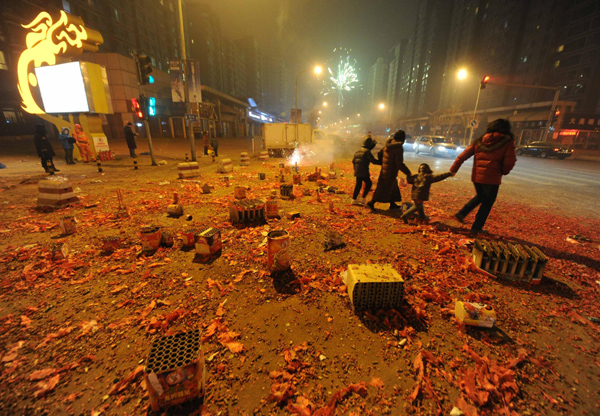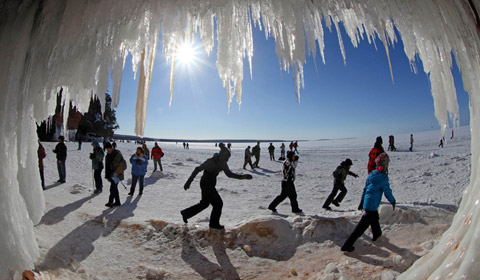Beijing govt criticized for ongoing smog
Updated: 2014-02-17 10:50
(Xinhua)
|
||||||||
|
 |
|
People leave after playing fireworks in Beijing on Feb 14, 2014. [Photo/Xinhua] |
However, the government has not initiated the emergency response once since the program came into effect on October 22, 2013, although the public has on several occasions complained of smog heavy enough to warrant a government response.
The government issued a blue alert for air pollution late on Saturday.
The city has a four-tier alert system, using blue, yellow, orange and red to indicate the air pollution level in order of increasing severity.
A red alert indicates the most serious air pollution, or Level 6 pollution, for three consecutive days. An orange alert indicates heavy to serious air pollution, or Level 5 to Level 6, alternately for three consecutive days.
The latest round of smog started on Friday, which marked both the traditional Chinese Lantern Festival and Valentine's Day. Holiday fireworks brought the air quality index (AQI) from more than 300 in the morning to 500 in the evening.
Residents questioned the lack of government action over the matter, believing authorities should have banned fireworks.
Wang Yuesi, a researcher with the Institute of Atmospheric Physics of the Chinese Academy of Sciences, said orange and red alerts required action by the public, such as cutting traffic, and government authorities were reluctant to issue the response as smog for three consecutive days is difficult to forecast accurately.
"Environmental authorities lacked preparation in responding to smog for both technical reasons and management reasons. All they hope is that continuous smoggy days like this never come," Wang said.
He also said the response would be useless even if traffic were cut and the plants suspended, because smog is not strictly a Beijing problem, but a common issue faced by a much larger region, including Beijing and Tianjin municipalities and the nearby provinces of Hebei, Shandong and Henan.
Wang's research last year found hazardous heavy metals in the air over Beijing came from ferrous metal smelting and coal burning in the Beijing-Tianjin-Hebei area.
On Sept 18, the Ministry of Environmental Protection and governments of Beijing, Hebei, Inner Mongolia, Shandong, Shanxi and Tianjin signed an agreement on pollution. The Ministry of Finance announced in October a 5 billion yuan ($824 million) reward for air pollution reduction.

 World's largest freshwater lake frozen
World's largest freshwater lake frozen
 American photographer wins World Press Photo 2013
American photographer wins World Press Photo 2013
 Zhou Yang retains women's 1500m title
Zhou Yang retains women's 1500m title
 Renzi set to become Italy's youngest PM
Renzi set to become Italy's youngest PM
 Kissing contest celebrates Valentine's Day in Beijing
Kissing contest celebrates Valentine's Day in Beijing
 Xinjiang quake damage could have been worse
Xinjiang quake damage could have been worse
 US East Coast buried in snow
US East Coast buried in snow
 China's Li wins women's 500m gold
China's Li wins women's 500m gold
Most Viewed
Editor's Picks

|

|

|

|

|

|
Today's Top News
Dallas shooting kills one, injures six
High-rise security tightened after stunt
Shelters reveal flaws in child welfare
Precipitation expected to clear up smog-filled skies
Police reveal details of Xinjiang terrorist attack
Canadian immigration changes called unfair
Finding real wealth in health industry
Courts try to improve efficiency
US Weekly

|

|




